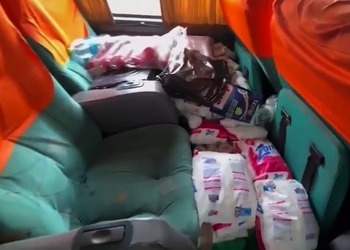Bus companies in Bolivia avoid carrying passengers in favor of carrying a much more profitable cargo: contraband.
Last year, more than 1,000 passenger buses were caught smuggling in Bolivia, according to a recent investigation by the Bolivian newspaper La Razón.
The smuggling network appears to be widespread, with more than 20 bus companies involved, Bolivia’s Vice Minister of Combating Smuggling, Brigadier General Daniel Vargas, told the newspaper. However, the penalties are low, with first-time offenders facing fines as low as $70.
Smuggling is a long-standing problem in Bolivia, but it appears to be on the rise. Last year, customs seized a record 737 million bolivianos (more than $105 million) in contraband goods, surpassing the record set the year before and nearly doubling the amount seized in 2020.
Next, InSight Crime looks at how smuggling has exploded in Bolivia and why so many people depend on it.
‘ant smuggling’
“Ant Smuggling” (contraband ant), through which individuals smuggle goods on a small scale, has been on the rise for a long time, Vargas told InSight Crime.
But the discovery of large-scale bus smuggling suggests the problem goes beyond isolated cases and extends to organized operations involving smugglers, corrupt officials and the transport companies themselves.
SEE ALSO:Lake Titicaca: a smuggler’s paradise in Bolivia and Peru
La Razón’s report found that bus companies involved in smuggling had become systematic in their operations: some “passenger” buses were found to be completely empty of passengers, instead of using exclusively for transporting goods. Ticket sellers and drivers now charge according to the goods being carried and secret compartments are added to the buses themselves.
Business owners are well aware of what’s going on, Vargas said.
“They are hardly interested in the number of passengers anymore and in some cases the people involved in smuggling rent the entire bus itself to put contraband goods inside,” he said.
Corruption is key
Corruption in the ranks of the authorities is vital to the continuation of smuggling, the paper found.
La Razón reported that between January 2021 and November 2022, 163 military personnel had been investigated for allegedly helping smugglers. Ten military personnel were arrested and five removed from their posts after being found guilty of soliciting bribes from smugglers, stealing confiscated goods and stealing contraband goods directly from smugglers.
Vargas insisted that the government is dedicated to eliminating corruption. “The current regulations are being enforced to the fullest extent,” he said.
Ivan Paredes Tamayo, a journalist specializing in illegal economies in Bolivia, said that most of the graft goes unpunished.
“It’s like drug trafficking. In the fight against smuggling there are corrupt officials and very few face justice. There are policemen and soldiers who are part of these mafias and they are not punished”, he said.
An accepted practice
La Razón found that the most popular route for smuggling was from Yacuiba, a town in the south on the border with Argentina, to the city of Santa Cruz, about 500 kilometers to the north.
SEE ALSO: Bolivia seems powerless to stop vehicle trafficking
Contraband goods arrive in Bolivia through each of its borders. In the west, smugglers move stolen vehicles from Chile, while Lake Titicaca, a natural border between Bolivia and Peru, is a vibrant center for the transfer of contraband: cocaine, fuel, mercury and wildlife move through its waters.
The buses, however, carry basic items used by almost all Bolivians. Argentine food products, cleaning products, vehicle lubricants, beer, pet food, canned goods, juices, energy drinks and cookies are some of the most commonly smuggled goods.
A growing need
The growth of buses involved in smuggling reflects a general expansion of Bolivia’s smuggling trade. According to Vargas, the economic consequences of the COVID-19 pandemic and the devaluation of the Argentine peso, which is affecting trade in certain Bolivian cities, have pushed a wider range of people into smuggling.
“Smuggling has grown thanks to the incorporation of these people who have lost their jobs,” said Vargas. The illicit economy now involves people who out of necessity have sought an alternative means of financial income, he added.
Smuggling activity increased with the pandemic and has not decreased since, Paredes said.
The Bolivian government has long struggled to tackle smuggling and the associated illicit economies with measures such as increased checkpoints and the deployment of drones in border regions. But some experts like Paredes believe more efforts are needed.
“The authorities are doing what they can,” he said. “There are results, but they are not enough to eradicate smuggling. What is needed are tools to fight this crime: more all-terrain vehicles, GPS, drones and personnel trained to fight smuggling.”
What are your thoughts? Click here to submit your comments to InSight Crime.
We encourage readers to copy and distribute our work for non-commercial purposes, with InSight Crime attribution to the author and links to the original at both the top and bottom of the article. See the Creative Commons website for more details on how to share our work, and please email us if you use an article.


